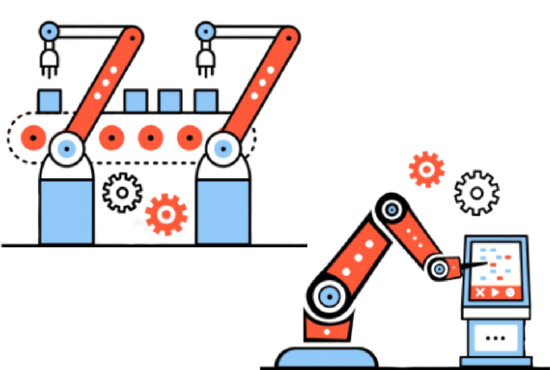Industries Served
Tailored Solution for Every Industry Needs
Leveraging the Manufacturing Industry with RPA Implementation
Analysts of the manufacturing industry thought that producing high-quality products at lower costs with a quick turnaround is wishful thinking until Machine learning algorithms, AI implementation, and new business models shaped by RPA in manufacturing happened. The support for uber-automation through optimized RPA in manufacturing operations fine-tune a gamut of production processes with the benefits of a short lead-time.
Process and Infrastructural Improvements through RPA in Manufacturing
RPA solutions like bot assistants, automated emergency monitoring systems, etc. have rejigged the entire manufacturing process in a cost-effective way by capturing, processing, and storing valuable data using Artificial Intelligence and Data Analytics. Bottom-lines in asset-reliant ERP, CRM, and PLM have been relaxed dramatically including the maintenance costs of the production machinery line through data flow augmentation using the deep-learning capacities of RPA-integrated systems. This has reduced expensive downtime while increasing the Remaining Useful Life (RUL) of the industrial infrastructure through RPA in manufacturing.
Besides increasing the product quality, we also use data analytics, artificial neural networks, and machine cognition to improve internal auditing, employee safety, and efficiency, plus inventory management through predictive maintenance and hazard prevention.

Assured Productivity through RPA in Manufacturing
It has been proved that RPA can reduce scrap rates while improving the fabrication process efficiently with reduced wastage. Asset management, supply chain optimization, waste management, risk management, and inventory management in manufacturing are the core areas that are being focussed on, where, the application of high-end and intelligent automation have disrupted delays and accelerated industrial productivity.
It is humanly impossible to predict the supply and demand market. By using the data mining and real-time analytics capabilities of RPA, manufacturers can forecast this information with absolute accuracy and underscore inventory control.
Streamlining Assembly-Line Processes
RPA is being implemented to streamline quality testing, assembling, and packaging by RPA in manufacturing units for automobiles, consumer goods, and many other industries. This ensures better productivity, lesser errors, optimized costs, and faster turnaround. It is easier to program the systems for consistent performance and complete compliance.
Ensuring Compliance
The manufacturing industry is governed by some strict regulations. Some of the areas that need strict adherence are finance, workforce health, machinery health, safety, waste management, and ecological compliance. RPA in manufacturing can be integrated with the central control systems using IoT which helps in raising critical flags and generating timely notifications. Threshold values are programmed into the machinery to raise timely alarms.
Remote System Monitoring
Thanks to the IoT integration into production units that are managed by RPA programs, anytime, anywhere monitoring of critical machinery functions and central control systems are possible today. The entire system can be locked down in case of an emergency automatically with the help of admin bots. Even system breaches or maintenance shortfalls can be captured by monitoring bots and timely interventions can be made.
Processes
INVENTORY MANAGEMENT
With competition levels rising and delivery windows shrinking, process solutions implemented through RPA in manufacturing are improving the end-to-end production of goods every day. RPA not only helps in streamlining production, but, helps maintain, augment, and assist in quality control with regards to the inventory. Ambient controls to store goods, ship-in, and ship-out from the warehouse, predictive analysis to determine shortages due to high-demand, and control over excessive production through cost-effective inventory management are some of the areas in which RPA consistently contributes in manufacturing. Read More >
PURCHASE ORDER CREATION
Once a production agreement is in place, the generation of a purchase order can be done automatically with the help of an RPA PO system. This minimizes manual intervention and errors Decision-making and calculations can be done without the need for human intervention. A strong audit trail can also be created to support future investigations. The RPA software automatically raises a purchase request and follows the workflow which includes assessing the request, approval seeking from the department head, and processing the request to raise the PO. Read More >
VENDOR MANAGEMENT
By systematizing vendor communications, recording and assessing responses, and automatically ensuring follow-ups, RPA in manufacturing has simplified vendor management RPA ensures better demand and supply planning through analytical forecasting. Alternative vendor mapping in the system takes place automatically with suggestions made by the system to the management to approach another vendor in case the existing vendor cannot fulfill the requirement. Read More >
ACCURATE AUDITING
RPA in manufacturing minimizes the processing time and helps in reducing errors in invoicing, payments, accounting, etc. OCR can be used to scan and extract data that gets stored in the system for future auditing. Internal audits can be conducted at regular intervals by RPA-integrated systems to conduct repetitive processes void of accounting fallacies. This will help the management plan investments and other finances better. Periodic reports can also be generated by the RPA system to highlight areas that need immediate attention. Read More >
Could not find the case?
Schedule a call with our Business Process Architect
Custom use case:
Just like human beings, these robots make use of the user interface for gathering data and interacting with applications to perform high-volume, tedious, monotonous and manual tasks. This helps businesses to shift their focus on more strategic and revenue-generating activities. Just like human beings, these robots make use of the user interface for gathering data and interacting with applications to perform high-volume.

